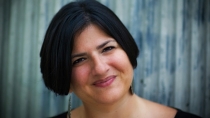How Can Facebook Help the Bereaved?
As a psychologist I’m often asked about what I think of social media. I’ve discussed the harm that can be done by the lack of accountability that can come from relative anonymity. I’ve spoken various times on TV about the “retrosexual” syndrome which is basically the idea of being stuck in the past. By rekindling old relationships you also risk stirring up the feelings associated with being young, care-free and in love thus leading to increasing dissatisfaction in your current “grown-up and mundane” relationship. I am personally a huge fan of facebook. It has been like this guilty little pleasure that felt too unprofessional to talk about. Well, fast forward to April 5, 2010, the day my father died.
After receiving the call around 7 am I was in shock. I sat for a few hours with the news. I began thinking of all the people I wanted and needed to tell. As a cyber extrovert, my first instinct was to put the news online but immediately became self-doubting. Having never lost someone close to me I began wondering “Isn’t it kind of cheesy to put something as big as my dad dying on facebook?” “Wouldn’t people think it was sign of disrespect?” “Will my good friends be offended that this is how they find out?” I realized that worrying about what others might think of me, at a time like this, was less important than focusing on what I needed. So, after a bit of back and forth, I made the decision to update my facebook status:
“I am feeling ambivalent about posting this on FB but it is easiest for me. My dad passed away this morning. While he’s been sick for a while his death this morning was very sudden. I feel a lot of feelings: shock, sadness yet profound gratitude for the peace and love that has evolved in our relationship in recent years.”
I didn’t inform people on facebook as some kind of exhibitionist (it isn’t like I used twitter.) I did it because it was a simple, efficient way to let a lot of people know something that I felt was important. It lifted the burden of figuring out how to contact several people, tell them what happened and answer the inevitable “how are you doing” question. Talking about something painful, over and over again, is not necessarily the best way to process it.
Today, as I write this, is exactly 4 weeks since my dad’s death. He had been sick on and off for a while but was actually on the upswing. The day before he died he had taken a walk along the beach with his wife. I’ve made it to age 37 without ever losing someone close to me. Advising people, comforting them and letting them know that it is okay to feel is way easier. Feeling this stuff your self kind of just sucks. In the future I’ll write a blog post about following my own advice and how many times I have told myself in recent weeks to just “suck it.”
Acute grief can feel like a really bad sunburn. For me even the slightest touch, to my very sensitive emotional skin, was painful and overwhelming in those first days. I really needed both the closeness of the love and support of others, yet also the space to be able to receive it.
Facebook provides the perfect balance of connection and space. I read condolence messages when I felt like it without feeling the need to respond when I couldn’t. After a few days offline, when I was ready, I began to express my pain and gratitude without feeling the need to have to muster up the energy to reach out to individuals out of obligation. It isn’t like I didn’t call a lot of people and share. It isn’t like I didn’t appreciate deeply the cards I received, the visitors that came by. But there is something about having an available village at any time of day on your own terms that is amazing. Social media is a powerful new technology that can help with the most primitive of human pain.
“After quite a few days looking inward I am grateful to be back focusing outward in order to help others look inward. Enjoyed being back at work today!”
In the past few weeks I have been able to keep people posted. Every dialogue doesn’t need to begin with “how are you doing Paula?” I get to update my status rather than having to respond to people inquiring about it. The day I returned to work at the clinic a coworker came in and asked if I needed a hug. I answered “yes, would love one, but it has to wait for the end of the day because I have a patient in a few minutes and don’t want to be crying when she comes in.” Emotional sunburns can take a while to heal.
I have had some ups and downs in these past weeks and have been able to share the journey. Facebook has made it much easier for me to be vulnerable, to allow others in and to transcend the sense of “have to’s” and “shoulds” which can interfere with the ability to grieve authentically. There’s been nothing virtual about this very real support.
“It takes a village and I have never in my life been so grateful for mine.”
I’m off to post a link to this blog post on facebook. My gratitude is real even if the thank-you note is virtual.

Dr. Paula Bloom Bio
Dr. Bloom is a practicing psychologist, speaker, and frequent CNN contributor.
Learn More